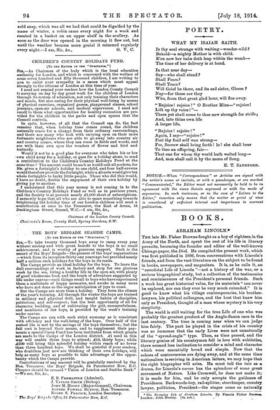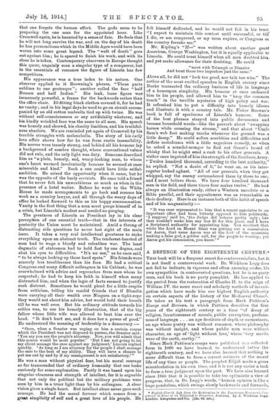BOOKS.
ABRAHAM LINCOLN.* THE late Mr. Fisher Browne fought as a boy of eighteen in the Army of the North, and spent the rest of his life in literary pursuits, becoming the founder and editor of the well-known Chicago paper, the Dial. He compiled the present work, which was first published in 1886, from conversations with Lincoln's friend; and from the vast literature on the subject to be found in books, newspapers, and magazines. It is, as he calls it, an "anecdotal Life of Lincoln "—not a history of the war, or a serious biographicarstudy, but a collection of the testimonies and reminiscences of the President's personal friends. Such a work has great historical value, for its materials " can never be replaced, nor can they ever be very much extended." It is good to know what his village contemporaries, his brother- lawyers, his political colleagues, and the host that knew him only as President, thought of a man whose mystery is his very simplicity.
The world is still waiting for the true Life of one who was probably the greatest product of the Anglo-Saxon race in the last century. The time is coming near when we can judge him fairly. The part he played in the crisis of his country was so immense that the early Lives were not unnaturally of the " spread-eagle " type. Then, as time passed, and the literary genius of his countrymen fell in love with subtleties, there seemed less inclination to consider a mind and character which were essentially broad and simple. Now that the echoes of controversies are dying away, and at the same time nationalism is reviving in American letters, we may hope that the right biographer will arise. He must tell the tale as a drama, for Lincoln's career has the splendour of some great movement of Nature. Like Cromwell, be does not make it; it is made for him, and he only accepts the guidance of Providence. Backwoods-boy, rail-splitter, storekeeper, country lawyer, politician, President—the stages come so naturally • The Everyday Life of Abraham Lincoln. By Francis Fisher Browns. London: John Murray. [8e. net.]
that one forgets the human effort. The gods seem to be preparing the one man for the appointed hour. Like Cromwell again, he is haunted by a sense of fate. He feels that he will not long survive the war, and on the day of his death he has premonitions which in the Middle Ages would have been woven into some great legend. The "waft of death" goes . out against him; he is spared to finish his work, and with its close be is taken. Contemporary observers in Europe thought this queer, ungainly man a singular type of a conqueror, but in the essentials of romance the figure of Lincoln has few competitors.
His appearance was a true index to his nature. One observer applied to it Browning's phrase, "Three parts sublime to one grotesque"; another called the face " half Roman and half Indian." His lank, loose figure was immensely powerful, a frame for the backwoods rather than the office chair. Ill-fitting black clothes covered it, for he had no vanity ; and in his legal days he used to go on circuit accom- panied by an old cotton umbrella tied up with twine. He was without self-consciousness or any artificiality whatever, and his kindly wrinkled face was the same to all men. His speech was homely and shrewd, his charity limitless, and his truthful.
ness absolute. We are reminded yet again of Cromwell by his terrible struggles with melancholia. The story of his early
love affair shows how far he was from rustic insensibility. His nerves were tensely strung, and behind all his humour lay a background of sombre thought, where conventional values did not rule, and the only light was duty. Someone described him as "a plain, homely, sad, weary-looking man, to whom
one's heart warmed involuntarily because he seemed at once miserable and kind." Such a one could have little selfish ambition. He seized the opportunity when it came, but be was the opposite of the burly arriviste. He once told a friend that be never felt his unworthiness so much as when in the presence of a hotel waiter. Before he went to the White
House be made arrangements to go back and resume his work as a country lawyer, and all through the weary days of office he looked forward to this as his happy consummation. Vanity is the first thing that a man must purge himself of in a crisis, but Lincoln's modest soul needed no purging.
The greatness of Lincoln as President lay in his clear perception of one essential truth—that in the interests of posterity the Union must be maintained. Amid a throng of distracting side questions he never lost sight of the main
issue. It takes a very real intellectual greatness to stake
everything upon an abstract truth. The tenderest-hearted of men had to wage a bloody and relentless war. The least dogmatic of statesmen had to hold fast by one dogma, and shut his eyes to difficulties. "It's no use," as he once said, " to be always looking up those hard spots." His friends were scarcely less troublesome than his foes. He had a critical Congress and many difficult colleagues in his Cabinet; he was overwhelmed with advice and reproaches from men whom he respected ; he bad to keep his faith in himself when many distrusted him, and when the logic of facts seemed to justify such distrust. Sometimes he would plead for a little respite from criticism, telling his candid friends that if Blondin were carrying all their wealth over Niagara on a tight-rope they would not shout him advice, but would hold their breath
till be was well over. But his ordinary attitude towards his critics was, to use his homely illustration, that of the big
fellow whose little wife was allowed to beat him over the head. "It don't hurt me, and it does her a power of good." He understood the meaning of leadership in a democracy :-
"Once, when a Senator was urging on him a certain course which the President was not disposed to pursue, the Senator said : `You say you are the people's attorney. Now, you will admit that this course would be most popular." But I am not going to let my client manage the case against my judgment,' Lincoln replied quickly. 'As long as I am attorney for the people I shall manage the case to the best of my ability. They will have a chance to put me out by and by if my management is not satisfactory."
He was a man without physical fear, but his moral courage so far transcended that of ordinary humanity that one looks curiously for some explanation. Partly it was based upon his singular clearness and strength of intellect, for it is arguable that not only the political but the military problems were seen by him in a truer light than by his colleagues. A clear vision gives a single heart. But intellect alone never gave such courage. He had the moral fervour which comes from a great simplicity of self and a great love of his ,people. He
felt himself dedicated, and he would not fail in his trust "I expect to maintain this contest until successful, or till*
I die, or am conquered, or my term expires, or Congress of the country forsake me."
Mr. Ripling's "If—" was written about another great American, George Washington, but it is equally applicable te Lincoln. He could trust himself when all men doubted him, and yet make allowance for their doubting. He could
"meet with Triumph or Disaster And treat those two impostors just the same."
Above all, he did not "look too good, nor talk too wise." The author of the most exalted speeches in English oratory since Burke transacted the ordinary business of life in language of a homespun simplicity. His humour at once endeared him to his people, and allowed him to " keep the common touch" in the terrible mysteries of high policy and war.
It refreshed him to put a difficulty into homely idioms and illustrate it with a country tale. Mr. Fisher Browne's book is full of specimens of Lincoln's humour. Sotto of the best phrases strayed into public documents and became household words—like the proverb about " swapping horses while crossing the stream," and that about "Uncle Sam's web feet making tracks whenever the ground was a little damp." He could soften acerbities and difficulties and deflate melodrama with a little sagacious comedy, as when
be asked a scandal-monger to find out Grant's brand of whisky that he might send a cask to his other generals. A visitor once inquired of him the strength of the Southern,Army. " Twolve hundred thousand, according to the best authority," he replied. "Not a doubt of it," he went on, as his inter- rogator looked aghast. "All of our generals, when they get
whipped, say the enemy outnumbered them by three to one, and I must believe them. We have four hundred thousand men in the field, and three times four makes twelve." He had always an illustration ready, either a Western anecdote or a Bible parallel, and their appositeness was as remarkable as their drollery. Here is an instance both of this habit of speech and of his magnanimity :—
" It was once represented to him that a recent appointee to an important office had been bitterly opposed to him politically. suppose,' said he, 'the Judge did behave pretty ugly ; but that wouldn't make him any less fit for this place, and 1 have a Scriptural authority for appointing him. You recollect that while the Lord on Mount Sinai was getting out a commission for Aaron, that same Aaron was at the foot of the mountain making a false god, a golden calf, for the people to worship; yet Aaron got his commission, you know."











































 Previous page
Previous page